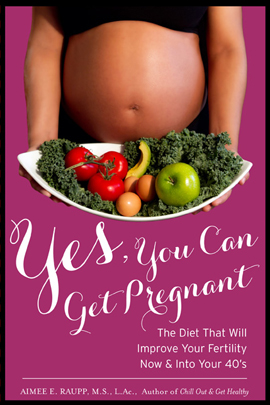Like so many women, Jan found herself in her thirties with a career, a husband, and a strong desire to get pregnant. At 33, this corporate attorney had already had one miscarriage and two unsuccessful IUIs (intrauterine insemination), and she was “very upset and unsettled,” as described in Aimee Raupp’s new book Yes, You Can Get Pregnant: The Diet That Will Improve Your Fertility Now and Into Your 40s. 
Jan is a real-life client of Aimee’s, a licensed acupuncturist, herbalist, and author of Chill Out and Get Healthy, who is included as a case study in this new book. Jan is described as arriving at Aimee’s office with a diet iced tea and a story of “fertility reducing eating habits,” a nutritionally void diet of low-fat, sugar-free, processed foods. Jen is probably not unlike a lot of women visiting Aimee or fertility specialists across the country; in fact, she’s probably more like the average infertility patient than not.
Where Jan may take a left fork in the road is in the diet she now follows, as prescribed by Aimee and outlined in the Yes, You Can Get Pregnant book. Today, Aimee excitedly told me that Jan is pregnant, and she did it naturally without the invasive IVF she was prepared to do. Aimee explained that Jan cleaned up her diet, took liver pills, and did eight acupuncture treatments. Then, after two menstrual cycles, learned she was expecting.
So is another of Aimee’s clients, a 43-year-old woman pregnant with her second child. “She followed my diet to a T, better than I do sometimes,” said Aimee. “She’s 20 weeks pregnant with a clean amnio.”
So what is Aimee prescribing that’s helping these women achieve the pregnancies they so desire? Just like Jan and the 43-year-old mom, they’re laser focused on what they eat as much as what they don’t.
“Since I’ve gotten stricter with my girls’ diets, I’ve noticed they get pregnant faster than ever before in my practice,” said Aimee.
Yes, You Can Get Pregnant: The Diet is a 51-page guide and preview of a full book of the same name due out next spring. In it, Aimee outlines her research showing that how a woman eats can and does directly impact her fertility and ability to conceive, whether naturally or through medical means.
Namely, she has three “Yes” foods that every woman should she be eating: animal protein, fats, and fruits and vegetables.
“We can’t improve the quantity of eggs, but we can improve the quality,” said Aimee. “We just need one good egg!”
And eggs are actually one of Aimee’s yes foods under animal protein. She highly recommends eggs with yolk for the choline they provide. For eggs or any other meat product, Aimee says they should be pasture- or farm-raised or grass-fed animals. Not only is it something that is important to her from an ethical standpoint, but the hormones and antibiotics found in conventional animal sources “cause excessive disruption to a woman’s system,” she said.
Fats also make the list for yes foods on Aimee’s fertility-focused diet. She suggests that the amount of vegetable oils we eat actually turn what should be a 1:1 ratio of omega 6 to omega 3 fats in to a 20:1 ratio. “This translates into hormone and endocrine issues like PCOS, irregular periods, and other fertility issues,” explained Aimee. Even regular butter instead of margarine is one way she recommends to get these necessary fats.
 Finally, fruits and vegetables are a vital part of any diet, whether or not you’re trying to get pregnant. But for Aimee’s patients and the millions of women like them, she says these plant foods are “the best way to get antioxidants, which protect us from free radicals that age us. For pregnancies later in life, we want to hinder the age-related factor as much as impossible.”
Finally, fruits and vegetables are a vital part of any diet, whether or not you’re trying to get pregnant. But for Aimee’s patients and the millions of women like them, she says these plant foods are “the best way to get antioxidants, which protect us from free radicals that age us. For pregnancies later in life, we want to hinder the age-related factor as much as impossible.”
For all of these “Yes” foods, no doubt Aimee has “No” foods, too, and the list should come as no surprise. The biggest change in diet for women following Yes, You Can Get Pregnant is the removal of these five foods: gluten, soy, added sugars, artificial sweeteners, and pesticides, which means exclusively eating organic fruits and vegetables.
Whether embarking on your quest to get pregnant for the first time, or feeling like a veteran of the infertility world, your diet should be just as important as tracking your ovulation.
One in seven couples experience some form of infertility, including Jan, Aimee’s 43-year-old client, and even myself. While I wasn’t a patient of Aimee’s, I certainly would have been open to any ideas on improving the odds that my IVF cycle would be successful. I eat a clean diet as is, and given my own experience and seeing research, including what’s included in Yes, You Can Get Pregnant, I have to believe that it was a contributing factor in my successful treatment.
Jan was this close to going through with an IVF cycle, which, speaking from experience, can be incredibly taxing on your budget, sanity, and overall physical well-being. If you’re facing thousands of dollars for treatment, weeks of painful shots, and the uncertainty that any of it will even work, consider editing your diet first and see if it doesn’t get you any closer to your dream.
Also Read:
The Gluten Weight-Gain Connection, by Aimee Raupp
